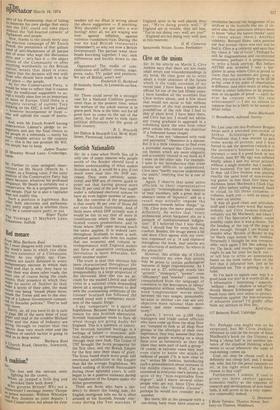Scottish Nationalists
Sir: At a time when North Sea oil is only one of many reasons why people south of the Border should have a better understanding of what makes Scotsmen tick, it would be a pity if too much were read into the SNP successes. They were certainly sensational, and SNP are, of course, quick to point out that having gained more than 21 per cent of the poll they ought under a reformed electoral system to have an even higher number of seats.
But the converse of the proposition is that nearly 80 per cent of Scots did not vote Scottish Nationalist. And of those seats which SNP actually won it would be fair to say that all were in constituencies where the less sophisticated voters predominate, and in those where SNP came second much the same applies. It is indeed rare. throughout Scotland, to meet a wellinformed person who does not realise that our economic and cultural interdependence with England makes any form of separation unthinkable. Devolution is more debatable, but quite another matter. The truth is that this election has been characterised throughout the United Kingdom by a mood of petulant irresponsibility in a large proportion of the electorate. How else can we account for the wasted Liberal and other votes in a national crisis demanding above all a strong government to deal with the overweening ambitions of the Unions? Scotland has followed the overall trend with a temporary extension of the lunatic fringe.
I say 'temporary' in a spirit of hopefulness. Because there is a further reason for this Scottish aberration. Scottish Nationalism tends to flare up when things are going badly for England. This is a question of history. The Scottish national heritage is a heritage of failure — economic, political, military — not necessarily always through their own fault. The Union of 1707 brought the Scots prosperity for the first time, and the British Empire for the first time their share of glory. The Scots found much more pride and emotional satisfaction in the Empire than did the average Englishman. We heard nothing of Scottish Nationalism during those splendid years. It only began to be a positive nuisance during the liquidation of the Empire under the Attlee government.
There are Scots who have a tendency to desert the losing side. An English immigrant tells me he is often amused at his Scottish friends' reactions during the Test matches. If England seem to be well placed, they say, "We're doing pretty well." If England are in trouble, they tell him, "You're not doing very well, are you?"
England are not doing very well, just at this moment.
D. H. Cameron Spoutwells House, Scone, Perthshire


































 Previous page
Previous page